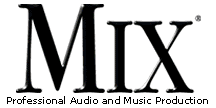
Barry's Mix Magazine Equipment And Software Reviews
Barry's Massive Discography And Engineering Career
Barry's Music Connection Magazine Reviews
Barry's Resolution Magazine Reviews
Apogee Rosetta 200 Stereo Converter
By Barry Rudolph
|
SPECIAL FEATURESThe Rosetta 200 accepts and outputs all formats of digital audio including single- and double-wire AES for 88.2 through 192kHz rates and either ADAT S/MUX or S/PDIF. In fact, you can convert between S/MUX and S/PDIF. Sample rates are switchable between 44.1, 48, 88.2, 96, 176.4 and 192 kHz. Apogee's Intelliclock uses a 'read' clock with a wide acceptance range to quickly lock to any incoming digital audio. Once a two-sample audio buffer is filled, a second low-jitter 'write' clock re-clocks the buffer's output to the converters. Lock is instant with minimal latency. Sync source or clock can be set to internal or derived from the rear panel word clock BNC I/O connectors (now with switchable 75-ohm termination). You can clock from any incoming digital sources presented to the rear panel's S/PDIF, AES/EBU, ADAT optical ports or from the expansion I/O card slot. There are three optional expansion I/O cards ($595 each) available: the X-HD or X-Digi-Mix cards for direct connection to Pro Tools|HD or MIX Plus Core cards, and the X-FireWire card for Mac OS X or Windows XP host-based DAWs. The X-FireWire card enables full MIDI interfacing to a computer but is not required for loading downloaded software updates from a computer via the unit's rear panel MIDI ports. A USB port seems better for updating as most computers have them and not a MIDI interface. TAKE ME TO THE CODACODA comprises three separate processes: sample rate conversion, Apogee's UV22HR word length reduction algorithm and Aptomizer. A first time feature for Apogee, a high-end Texas Instruments SRC4192 chip accomplishes real-time sample rate conversion. Built-in real-time sample rate conversion is a lifesaver when making reference 44.1 CD copies of work done at 96 kHz or incorporating samples, loops, audio clips or sound effects into your session that are not at the same rate. You can sample rate-convert digital audio from any single input to another digital output and check quality on the analog outputs. In my testing, I could not detect any change in sound quality when sample rate converting--ever. Auto SRC is an update coming (not implemented in my ver 1.0 unit) that would automatically apply SRC to any digital input that is detected to be non-synchronous with the 200's clock. Auto SRC is usually only available in very high-end DAW systems like Fairlight's QDC-based Dream or Cube-Tec's AudioCube 5. For CD mastering, the 200 comes with UV22HR, Apogee's 24 to 16-bit dithering process, allowing 16-bit CDs to retain more of the quality and resolution of their 24-bit masters. Aptomizer is a kind of analog normalization with a "learn" mode where the maximum analog level is read and used to recalibrate the A/D input level to result in consistent -0.5dBfs digital levels. Level adjustments of up to +/-20dB are automatic with Aptomizer. The 200 defaults to -16dBfs reference calibration and it's simple to change this at any time with the +/- Trim controls. In cases where the 200 is doing AD/DA for interfacing a piece of analog gear inserted into your DAW system, unity system gain is preserved by also adjusting the D/A calibration level simultaneously! But if you are using the 200 for your main DAW I/O, this is a bad idea because the analog output level of the D/A will go down/up along with the calibrated level of the A/D. There should be a way to unlink the D/A when using Aptomizer. A separate processor from CODA, Soft Limit is an analog limiter that rounds off transient peaks for maximum -4dBFs levels using instantaneous attack and release times. IN THE STUDIOMy D/A tests started by connecting CD and DAT machines via S/PDIF. An Analog Devices AD1852 chip handles digital-to-analog conversion within the 200 and my DATs and mastered CDs revealed new information and detail I had never heard--and I mixed them! The 200's D/A was clearer throughout the whole frequency range, with a wider stereo image, a more solid low end and high-frequency extension--but not brighter. At a mastering facility where I thought quality differences--if any--would be easier to hear, I compared the 200 to a $5,000 Prism ADA-8 system. The digital sources to the 200 and the Prism were clocked from a Z-Systems Z-3SRC. The differences were subtle: The Prism had a very slightly deeper bass or just more bass and possibly a little more high-frequency openness. At the recording studio I compared the A/D converter at 96kHz to the Alesis MasterLink and had no problem hearing a quality difference. The 200 uses a Cirrus Logic CS5361 chip for A/D and I found the 200 was a touch louder (monitoring through the ML's D/A) and clearer in the high frequencies. As a torture test, I set up a mix and purposely slammed the 200 with many "overs," letting Aptomizer learn the song's loudest moments. What normally is for me an ongoing process throughout a mix--tweaking the analog level to the A/D--now takes just one pass. When I kicked in Soft Limit, I got the hottest digital levels possible without applying any stereo compression. READY FOR HI-DEFI'm completely sold on this modern and worthy unit that is more than up to the critical task of A/D conversion. Besides the great sound of the converters, Aptomizer is a "level insurance policy" saving tedium and time in the studio. As a production tool, real-time sample rate conversion is great if you're a producer who always uses a 44.1kHz session rate because you like using 44.1kHz sample CDs; you can go 96 kHz-- no excuses now! Apogee Electronics, 310/915-1000, www.apogeedigital.com. Also thanks to Dan and everyone at LAFX Studios and John Vestman Mastering for their help, time and ears! |
|
|
|
All Web Page Design Is Copyright © 2005 through By Barry Rudolph